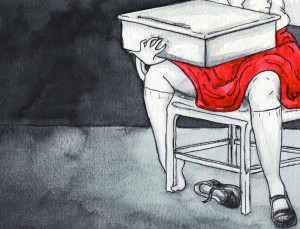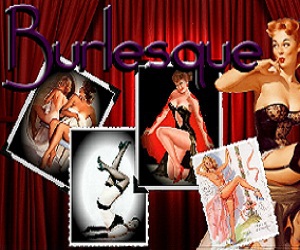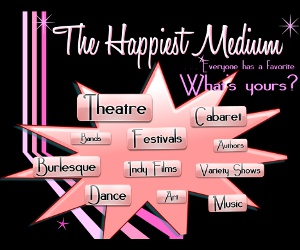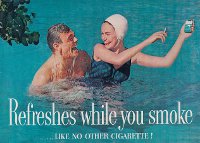
Playwright Lucy Gillespie
I recently got a chance to chat with the very charming young playwright, Lucy Gillespie, who has penned the upcoming play Hangman School for Girls which is being produced by Vagabond Theatre Ensemble. As the title of this post implies, this is a story involving the students at an all-girl’s school, although any resemblance to that Tootie-Blairefest of your youth (or, for the Millennials in the crowd, from hulu.com then) is purely coincidental. This ain’t your momma’s Eastland … schoolgirls don’t roll that way anymore. Rather, Hangman School for Girls was presented to me as “Alice in Wonderland meets Lolita with a little Mean Girls thrown in”. Ahhh, three very unlikely pairings, but three very guilty pleasures of mine.
Lucy Gillespie and I spent some time talking about all-girls schools, the challenges of acting in your own work … and what it takes to feel like you’ve “made it” in this big city.
Ms. Gillespie speaks with a lilting and lovely English accent; she’s a self-described Anglo American with a mom who hails from the great state of Illinois and a dad who comes from England, both of them journalists. Lucy herself grew up in London and spent a lot of time in an all-girls school herself, finding herself writing to amuse herself whenever she drifted off in a boring class. Later Ms. Gillespie attended Northwestern University where she not only discovered improv (which she is a huge fan of to this day) but also “fell out of love” with novel writing and started focusing more on play-writing, so it makes sense that these elements would comet together to bring about Hangman …
First of all … Hangman School for Girls. Love the title! It’s so immediately evocative. And I’m fond of the concept of using the premise of all-girl schools in general since I went to them for half my life as well, so I know what you’re talking about. Did you set the play in a school like that because that was your experience?
LG: Well the “Hangman” part literally comes from the game of Hangman … but the rest, the idea of centering it in a school for girls … it’s exactly that, having gone to one, I wanted to describe that painful process, the slow discovery at school of who you are …
… and just focus on that all girl dynamic.
LG: Exactly. It’s a very specific thing and I wanted to use that setting.
Sounds like it wouldn’t make sense to have you put these characters in a co-ed school then.
LG: No! No co-ed school! Of course, you write what you know. You get people who hear you went to an all-girls school and say “Really??? What was that like?” But it’s just what you know. It does create very different people, I think. I do remember being young and people saying “You’re very lucky, girls who go to co-ed schools are a lot more timid”. And of course in an all girl’s school the girls get to play the boys’ roles all the time since the boys aren’t there. You speak up more, you feel like you’re being heard. Going to a co-ed school never even occurred to me. I’m fascinated by girls and by women, and how they interact with each other. I’ve written male-dominated scenes in plays, but with men there doesn’t seem to be as much going on – fewer insecurities, fewer status-games. I love how tightly knitted women are. I love exploring that.
It’s true. Woman just have so many thoughts going on at once, they’ve always got an internal monologue of one type or another! So, if I showed up for my first day at the Hangman School for Girls - what would I see? Is this a Gossip Girl type prep school (minus the pretty boys), or more of downtown hipster place?
LG: Neither? Hmmm … The play is tricky because isn’t about the school, really … really it’s about the girl, Hazel. She’s not a member of the “in” crowd, so the whole story is from her perspective. Because she’s an outcast, she sees herself as a victim but she’s not a victim because she’s actually not very likable. The school day focuses on some of the games they play, and they’re starting off very young, these 11 year old girls, so the games are very reflective of their age.
Then as they get older it changes; for instance they all fight in this very involved courtroom scene that they all take part in. When the girls are younger they sort of parrot their parents but as they get older not only do you have the different personalities of girls emerging but also all the values and morals they have developed.

Hazel and The Desk get Cozy at Hangman School For Girls (art by Maya Battle)
The blurb for the show says “The play is Alice in Wonderland meets Lolita with a little Mean Girls thrown in”. So, can we expect a girl falling down a rabbit hole and sitting at a table having punchy Tina Fey type conversations with a man twice her age who’s trying to have sex with her? Or does it all play out a little differently?
LG: (Laughs) Noooo, it’s not at all like that! When I started writing, it all started with the “Desk” character that Hazel retreats to; an imaginary friendship Hazel develops when she fails to get into the “in” crowd. The Desk is the first character I wrote, and I had in mind the character of Humbert Humbert … The Desk hates it when girls grow up because they are no longer cute, dependent, awkward, and they don’t sit on him properly. But as the play developed, the Desk became more of a companion to Hazel; rather than someone who abuses her or victimizes her. It’s a very pure friendship (at least at the beginning). There are qualities he loves about Hazel. As far as the Alice in Wonderland connection … there are lots of games, everyone plays them. A lot of role play, and a lot of hearkening back to Greek Mythology. As far as Mean Girls, I really just tried to capture that period of time when you’re age 11 – 14 and viciousness is tossed around like rainwater … it’s just in the air all the time, with no thought to it at all.
You play Hazel Millet in your play, the main character. How did that happen? Did you audition alongside everyone else or did you always know you were going to play Hazel?
LG: Well, first of all, it’s an ensemble piece … so Hazel is less the main character as much as she’s just one of the girls. But she is the one who is involved with The Desk, so, yes, she’s a bit more prominent. I have a tricky time with acting, in general. I’m a taller girl. I love acting, I get a lot out of it, I love the ensemble experience but I have a hard time auditioning because I don’t have a sense of presentation. My acting training was Shakespeare rather than Musical Theatre — this very serious process … I was always very serious in my head. So yes, I wrote the play in part to give myself a strong role.
Having said that, I wasn’t 100% sure I wanted to be in Hangman School for Girls because I was worried about being in a play I was writing. I was worried that perhaps I’d affect the experience for everyone in some unintended way. I also wasn’t sure if Hazel was someone I really wanted to play. I can justify her and her actions … but I really don’t like her. I feel really sorry for her. I empathize with her, I want to help her, but I know there’s nothing to do to help. She’s 11 to 14 and very frustrated and very angry. I didn’t want to revisit the experience of being a very frustrated angry adolescent. But since the process started I’ve really enjoyed it! Like with Pinter – when he acted in his own works he would dissociate himself from his understanding of the play, and reinvent himself as a character and I’ve found I’m doing the same.
As the play came to life did you ever find yourself re-writing mid-rehearsal because you found a better way of saying a line? Or did you hear another character say something and think “oh, I could write that scene better?” I find that sometimes when I’m writing something I never know when to stop tweaking and I would think that the urge would be so strong to re-write if you’re acting in your own show just because you can.
LG: The script had a final draft on July 31st 2009 and that was it. I went on to another project, so I really had the sense on July 31st at 4:00pm to say “this is the end“. Then there were a few things the director and I worked with; we had a reading of it in December, which clarified scenes that required work.
The ultimate re-write deadline was the week before the first rehearsal. When we started rehearsal I told everyone involved “I am the writer, but I won’t be the writer in the room”. I told everyone to ask questions of the director – not me. I wasn’t going to play that role. Having said that, there were 3 tiny changes I made which everyone agreed with, but they were very minor and I felt they were fine. But other than that, I didn’t touch it at all.
I’m very impressed! That takes a lot of control, it shows a lot of restraint.
LG: It’s partly because I’ve got a lot of other projects going on and I just had to say “this is it”. But also, coming to New York, I find it’s like a hailstorm here. People don’t give you the benefit of the doubt. You can’t come here and call yourself a playwright because immediately someone will say “prove it”. So I really had to say “okay, I’m finishing it and that’s that” in order to be taken seriously.
What’s been the most unexpected thing that’s happened during this process — something that when you started putting this show together you never expected to happen?
LG: Definitely the enthusiasm with which the project has been met has been stunning to me, on all counts. Being someone who never sent things out, and who had focused mainly on acting to then make the leap of putting this play out in the world …to do a reading of the play in a group and feeling interest and engagement afterwards has given me an infinite sense of joy.
That’s great!
LG: It’s really cool! Another nice thing that happened is that my Mum came to visit and I slipped a copy of the script into her bag. Don’t forget, both my parents are writers and they’re very particular about what they read so I didn’t expect much. I called the next day to make sure her flight got in okay, and while talking to my Dad I told him what I’d done and he said he’d take a look. Now, he’s a man who never reads things written by women. He’s not misogynistic, it’s just never been his preference … but he read the whole thing right away and the next day he sent me this email, just this lovely note saying he was so interested in the struggle and the girls. He was really getting into it. That was a real moment of ”wow” for me.
I guess the last thing that’s been a great revelation is to see how much I really enjoy writing parts for women who only differ by a shade of grey, not by huge leaps. You always see two woman represented, one as the mother and one as the whore. You see it all the time for men, these roles that differ only by subtle shades of grey. All the roles in Shakespeare’s plays are like that for men … and that was something I was thinking of for these girls.
It’s so true – we need more plays about women who are similar, faced with the same choice, and then make different decisions. Those shades of grey you mention. Women are a lot more alike that you see them depicted, we’re not all archetypes.
LG: Exactly!
Well, these have been great answers. But it’s time for my last question, my favorite question … which I always like to leave up to the interviewee. You can use this time to talk about any topic. You can promote a cause, tell a joke, whatever you want. The floor is yours. No pressure. The mic is all yours —
LG: Well I would like to say that Improv is a wonderful thing and it’s changed my life! But for my shameless plug: On Monday (Tonight – Feb 22 @ 7:00pm) I have a reading of a play called The Atwater Project and it’s going on at PS 122; it’s part of the terraNOVA Groundbreakers Reading Series [for more information, click here] …. And on Tuesday (Feb 23rd) I wrote a very short 1 act called Fore-Shadow-Play which is part of Foreplays … a seductive evening of new works, sketch comedy, playing at Galapagos [for more information click here]. So come on down if you’re interested!
Thanks Lucy! And thanks for the great interview! We’ll definitely try and swing by. Congratulations on all your projects, and can’t wait to see Hangman School For Girls.
Hangman School for Girls opens March 11th 2010; check this spot for my review and more information in a few weeks.







{ 0 comments… add one now }